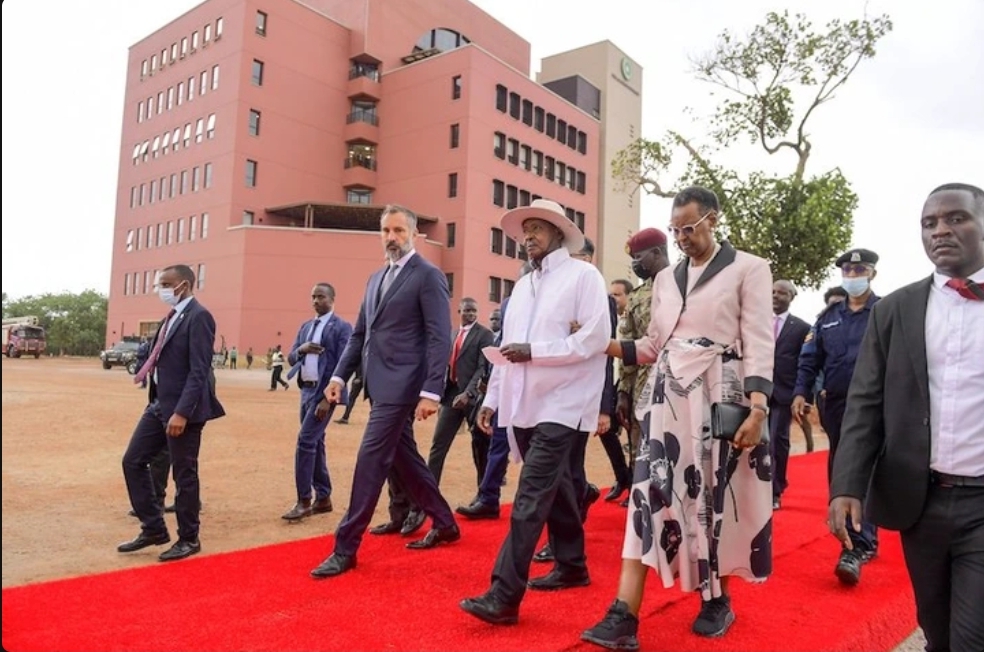Uganda gets a game-changer: Aga Khan’s million-dollar campus and hospital

President Yoweri Museveni and wife at the hospital commissioning
In Nakawa, Kampala, a sweeping new complex of glass and brick gleams with promise.
On September 11, 2025, His Highness the Aga Khan V, in his first visit to Uganda as the 50th Aga Khan and chancellor of Aga Khan University (AKU), inaugurated AKU’s newest campus and broke ground for a teaching hospital that leaders hope will redefine higher education and healthcare in the country.
“This campus means ambitious young people and skilled professionals will not need to leave their home country to study or practice at the highest level,” the Aga Khan said, addressing a packed gathering of dignitaries, students and community members.
“And many Ugandans will not have to travel abroad to obtain advanced health care.” The moment carried a symbolic weight beyond the bricks and mortar.
For decades, Ugandans with serious medical conditions have boarded buses or flights to Nairobi for treatment at the Aga Khan University hospital. The Nakawa campus, with its seven-story academic block, nine-story student housing facility, and a 101-bed teaching hospital, signals an intent to bring world-class training and care within Uganda’s borders.
The ceremony drew Uganda’s highest political leaders, including President Yoweri Kaguta Museveni, First Lady Janet Museveni, Health Minister Dr Jane Ruth Aceng, and international partners such as German deputy ambassador Peter Primus.
President Museveni used the occasion not only to congratulate the Aga Khan but also to confer Uganda’s highest civilian honor, the Most Excellent Order of the Pearl of Africa (Grand Master), on him—a recognition previously reserved for heads of state. Princess Zahra Aga Khan, honored with the Grand Commander distinction, was praised for her decades-long work advancing women’s empowerment, health, and education.
The German government, which invested €16.8 million through the KfW Development Bank, was lauded for its role in the project.
“This investment demonstrates our commitment to improving education and employment perspectives in East Africa,” Deputy Ambassador Primus said.
Uganda’s government, for its part, donated 60 acres of land for the campus. Museveni, recalling the expulsion of Uganda’s Asian community under Idi Amin in 1972, noted the irony and redemption in the day’s events: “If past governments had not interfered with the Shia community’s development, they would be very far,” he said.
The Aga Khan Development Network (AKDN) and Uganda’s Ismaili community have since become pivotal to the country’s economic and social recovery, through projects ranging from the 250MW Bu- jagali Hydropower Plant to the Kampala Serena Hotel.
BUILDING A HUB FOR HEALTH AND LEARNING
For AKU, founded in Karachi in 1983, the Nakawa campus is its first full-scale university outside Pakistan. It will expand Uganda’s School of Nursing and Midwifery and, for the first time, train physicians and postgraduate specialists in surgery, cardiology and other fields.
The first Bachelor of Nursing Science students begin later this month. Dr Sulaiman Shahabuddin, AKU vice chancellor and president, said the dual mission of the institution—education and healthcare—will be anchored in the hospital.
“This will be more than a hospital. It will be a training ground for doctors, nurses and researchers, while at the same time providing critical care for Ugandans,” he explained.
The hospital will feature an ambulatory care center, advanced diagnostic services, and an integration of education with practice. With time, officials say, Ugandans will be able to receive treatment for conditions such as cancer and heart disease without traveling abroad, while young professionals will access postgraduate training previously available only overseas.
A VISION ROOTED IN SERVICE
For Uganda’s First Lady Janet Museveni, the project embodies a deeper philosophy.
“While AKU is a private facility, it will continue to uphold His Highness’s spirit of community welfare and service to humanity,” she said.
The Aga Khan himself framed the project as part of a broader mission: not charity, but investment in human potential. His words echoed the founding ethos of the Aga Khan Development Network, which has long positioned education and healthcare not as luxuries, but as rights that underpin stable, prosperous societies.
The Nakawa campus, with its promise of modern laboratories, dormitories and a teaching hospital, is still in its infancy. Yet the symbolism of September 11, 2025, is unmistakable: Uganda is no longer simply the recipient of aid but a site of global-standard innovation in education and healthcare.
“This is not just about buildings,” President Museveni said. “It is about what will happen inside them—the knowledge, the healing and the opportunities that will grow here.”
If the Aga Khan’s vision holds, Nakawa will become more than a campus. It will be a bridge, keeping Uganda’s brightest students at home, its patients closer to care, and its place in the world more firmly secured



0 Comments